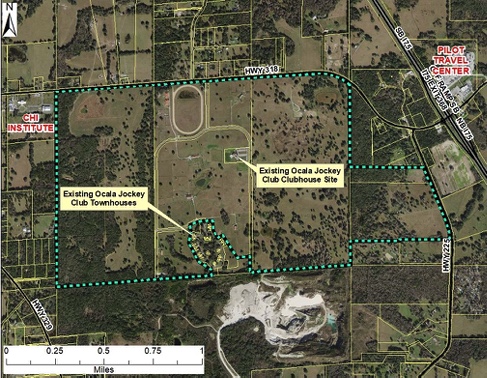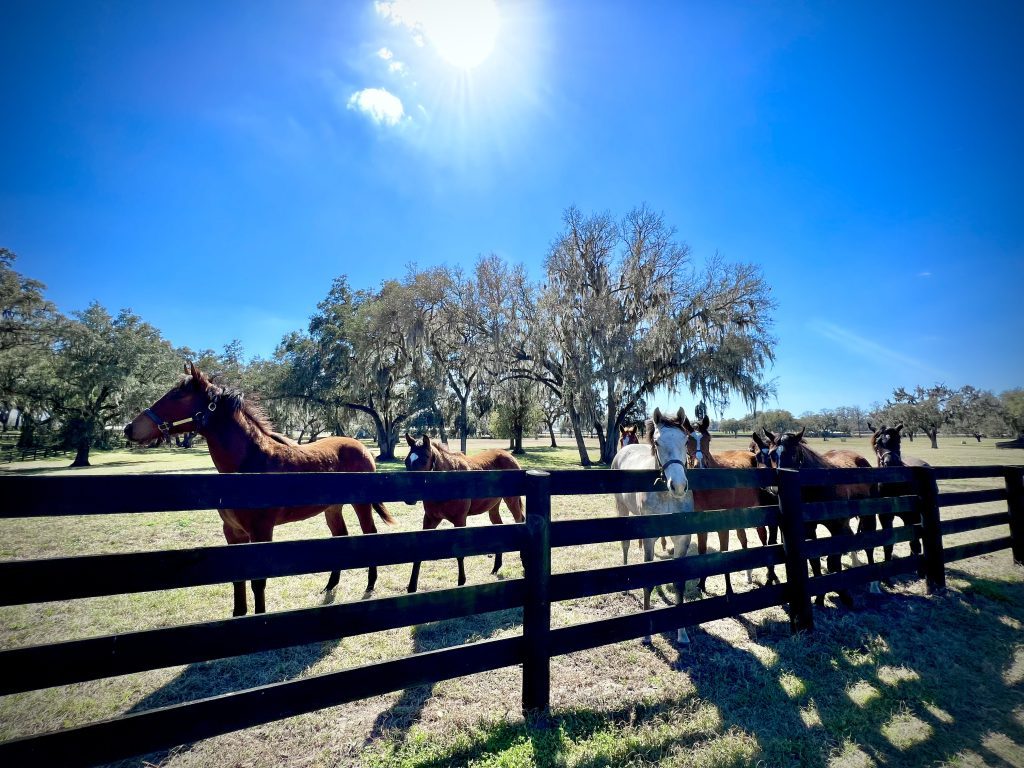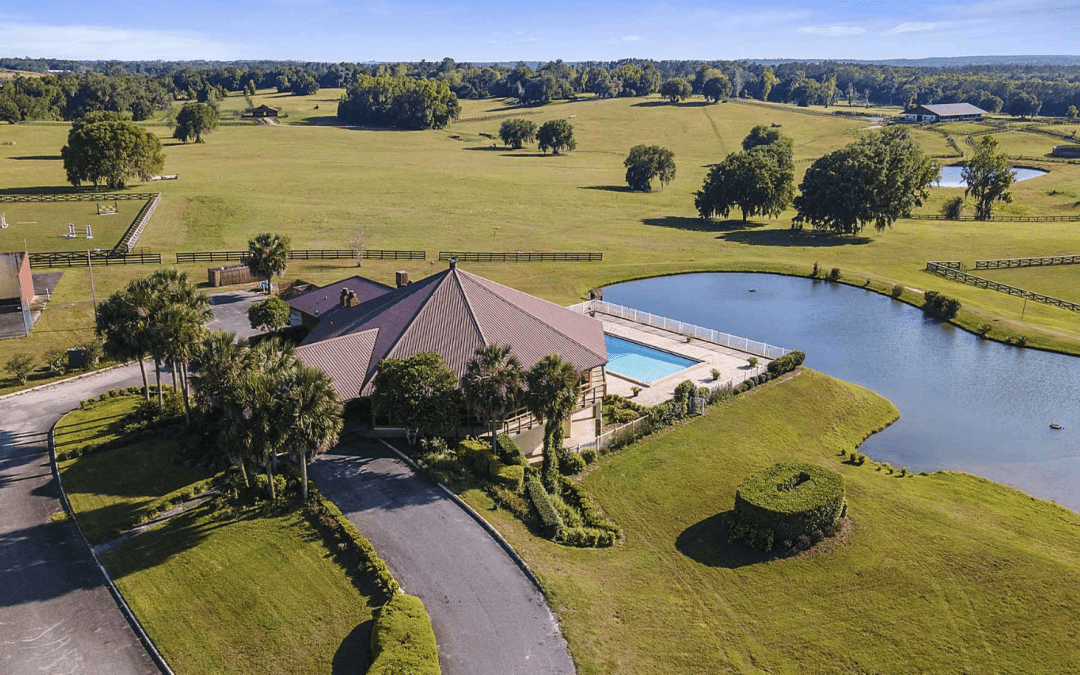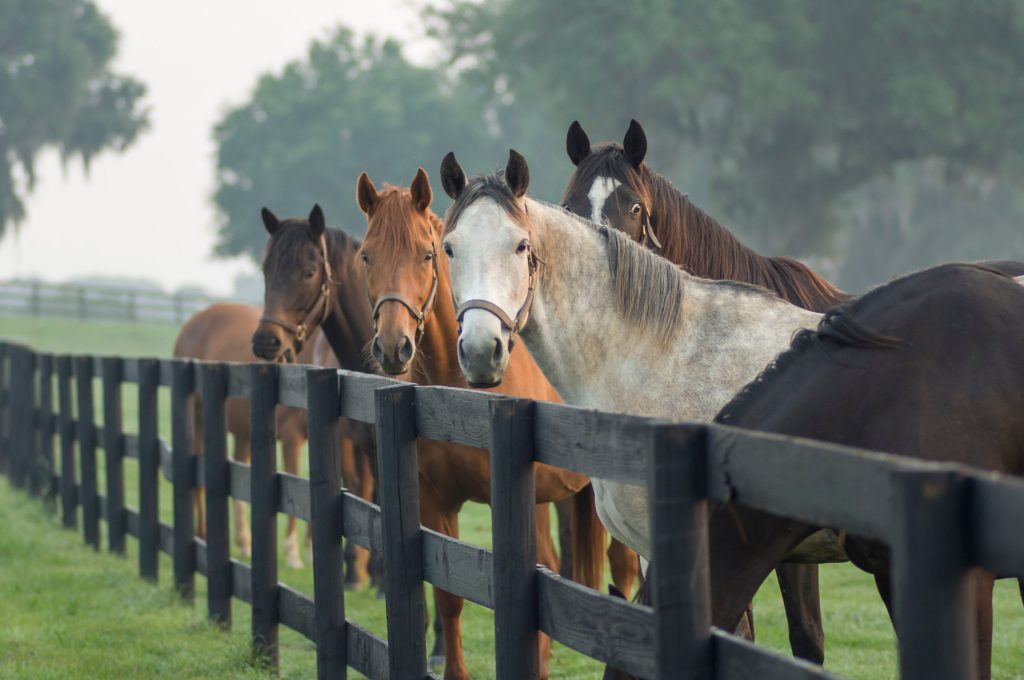Aerial view of the 10,125 square foot existing clubhouse at Ocala Jockey Club, which sits on the second highest elevation in Florida and features expansive views and spectacular sunsets. Photo: Sotheby’s
On June 21, the Marion County Commission approved Golden Ocala Equestrian Land’s (GOEL) plans for the World Equestrian Center Jockey Club (WEC-JC). Not everyone agrees with their decision, but important and passionate opinions emerged from the community-wide conversation about this matter: the Farmland Preservation Area is a top priority and one of the reasons why many people have chosen Marion County as their home.
While the Commission’s final vote was 3-2 in favor of GOEL’s plans for WEC-JC, their support of the Farmland Preservation Area (FPA) was unanimous. With that said, there were different opinions as to what protecting the Farmland Preservation Area means, especially when it comes to compatible and non-compatible uses. Over the past four years, Horse Farms Forever (HFF) has been focused on our mission to inspire the conservation of horse farms through education, awareness and idea exchange so as to preserve natural pasture land focusing on horses and their habitats.
We believe that the continuation of the Ocala Jockey Club (OJC) as an equestrian event facility under the stewardship of the Roberts family will do more to protect horse farms in that region of the FPA because it is the right type of development to help keep horse farms, as horse farms. And for the most part, the WEC-JC plans aligned with the current use of the property and the former owner’s plans for the property, which included a boutique hotel, retail village, and upscale residential development. The continued use of clustered home sites allows almost half of the WEC-JC property to be reserved for equestrian activities.
You can read our position statement about the plans for WEC-JC here.
You may or may not agree with our position or the Commission’s vote, but of the two most likely current scenarios for the property detailed below, which one does more to protect horse farms in northwest Marion County?
- Subdividing the entire 1,029 acres into a 10-acre lots?
- The spectacular view and open spaces would be gone.
- The 520-acre equestrian event facility and 4-star cross-country course would be gone.
- The risk of Family Divisions could potentially triple the number of lots.
- Hundreds of individual wells and septic systems.
- Clustering 94 lots of 3-acres or more on 420 acres?
- A higher density of residential areas allows for large, open common areas for equestrian uses.
- Water and wastewater treatment facility to protect water quality.
- The 520 acres for open space and the renovation of an existing equestrian event facility.
- Developing 89 acres to allow for the continued use of the existing clubhouse, adding a RV park and 9 arenas and grand stands for equestrian events (with 9,000 seats total), commercial/retail space, and polo fields.
And there is a third potential future scenario that is most alarming. When a 1,000-acre parcel of open pasture right next to an interstate exit, 20 minutes south of one of the premier universities in the country, and directly next door to Regional Activity Center and designated Commerce/Employment overlay zones is up for sale, our biggest fear is that it will be targeted for commercial development.
If a high-profile company like Microsoft or Apple had partnered with the University of Florida to propose a technology complex there, the economic pressure on the commissioners from the state and the community could have been overwhelming. Especially as we face another potential economic recession.
Population Growth and Supporting the Equine Industry
Our position took into consideration the exponential population growth in Marion County, which is predicted to increase over the next 20 years with 150,000 new residents. This growth will create tremendous pressure on landowners in the FPA to subdivide horse farms and farmland into smaller and smaller parcels. How do horse farm owners resist the pressure to subdivide their land or sell to a developer? Their businesses depend on showcasing the horses they breed, raise, and train at equestrian event facilities.
What would Marion County be without H.I.T.S. and Live Oak International (both located in the FPA), and the World Equestrian Center, Ocala Breeders Sales Arena, the S.E. Livestock Pavilion, the Florida Horse Park, Majestic Oaks, Barnstaple South, and numerous other horse show facilities on private farms, many in the FPA. Now the WEC-JC will be added to this impressive list of facilities and help serve and sustain the growing equine industry in Marion County.
Setting a Precedent
Opening the door to future commercial development in the FPA is a concern shared by HFF, but the majority of the proposed improvements on the WEC-JC property will be to support equestrian events – horse barns, riding arenas, maintenance barns, and restoring the existing cross-country course. The RV parking and multiple arenas and grand stands, plus the addition of commercial space will support the economic viability of the equestrian events. Also, with the WEC-Rural Land Use (see page 4 of the document), this effectively limits the use of the property to equestrian uses only, so the facility cannot be used for rock concerts.
In addition, any future landowner would have to submit an application to change the Land Use to WEC Rural and an application for a Comprehensive Plan Text Amendment to use the WEC Rural Land Use designation for that specific location. Both the Planning & Zoning Commission and the County Commission would evaluate both applications as presented.
The amount and type of commercial uses are consistent with large equestrian event facilities. For example, the Kentucky Horse Park (KHP) covers 1,229 acres and provides space for several tourist attractions and museums, competition facilities, a 5-star cross-country course, 260 RV spaces with a general store and recreational facilities, and office space for more than 30 national and regional equine organizations. KHP also has a 7,400 seat-arena, (Rolex Stadium, main grandstand.)

Let’s look at some of the other issues brought forth, such as the 10-acre lot size requirement for the FPA, the recently adopted HFF Comprehensive Plan Text Amendment, and the existing B-2 Zoning at WEC-JC:
Ten-acre Lots in the Farmland Preservation Area
In the Farmland Preservation Area (FPA), the minimum lot size is 10 acres. While Horse Farms Forever strongly favors maintaining 10-acre or larger parcels within the FPA, there are numerous areas within the FPA where smaller lots exist. For example, there are over 1,000 existing 3-acre lots in the area surrounding the OJC property.
While 10-acre lots are required in the FPA, unless the property is located in a Rural Activity Center (RAC), which allows up to two dwelling units per acre, there is a waiver process in Marion County’s Land Development Code that allows for a Family Division. For example, this waiver enables landowners to divide a single 10-acre lot into 3 smaller lots for the use of immediate family members as their primary residence.
With the Family Division waiver available for landowners, if 10-acre lots were platted on the OJC property, a single 10-acre lot could potentially be further divided into a 4-acre lot, a 3-acre lot and a 3-acre lot, thereby tripling the number of homes. In contrast, the 94 three-acre lots proposed by WEC-JC cannot be further divided, thus ensuring the number of homesites will never be more than 94 lots. In addition, the proposed lots are required to have central water and sewer, which helps protect water quality and spring sheds.
The 94 lots proposed at WEC-JC are consistent with the density allowed on the 1,029-acre property, but instead of being spread out over the entire landscape, they are clustered on 420 acres. This leaves about 520 acres for open space and an equestrian event facility. The OJC property already has 34 existing clustered townhouses, so there is consistency in this planning.
Horse Farms Forever® Comprehensive Plan Text Amendment
The Horse Farms Forever® Amendment, which requires that all Zoning Requests and Special Use Permits be consistent with the goals of the Farmland Preservation Area, became effective on April 30, 2022. The WEC-JC application was submitted before the HFF Amendment became effective, therefore, while all future applications will have to meet this standard, it does not apply to the WEC-JC application.
Nine Arenas with 9,000 Seats TOTAL
The WEC-JC application includes a Development Uses chart with the proposed uses. See page 5 here. There are 9,000 Seats for the: Arena & Event Facilities at WEC with accessory concessionary uses (snack bars, limited retail, etc.) The 9,000 seats will be dispersed at 9 different arenas and several event facilities, and with the WEC Rural Land Use category, the use is limited to equestrian events only. See page 4 and 5 here for the list of proposed arenas at WEC-JC and here for a list of existing arenas at WEC Ocala.
Existing B-2 Zoning at the Jockey Club
It’s important to remember that the WEC-JC has a designated zoning that gives the owner the right to use those property rights. On the WEC-JC property, there is a pre-existing commercial site of 5.84 acres with B-2 Zoning for the clubhouse and surrounding area. B-2 Zoning allows for commercial uses including hotels, nightclubs and RV rentals.
Process and Next Steps
GOEL will submit a Master Plan for approval by the County Commission and a Developer’s Agreement for the water and wastewater treatment plant and the roadway improvements within 6 months. GOEL is responsible for their proportionate share of the roadway improvements.
As part of the state’s review of the WEC-JC application, while there were no objections, several state agencies provided comments and made recommendations including the Division of Historical Resources and the Florida Fish and Wildlife Conservation Commission. Any potential historic resources or endangered wildlife will be addressed by each respective agency. Also, the addition of a water and the wastewater treatment plant will help protect water quality.

What Makes This Slice of the Farmland Preservation Area Unique?
What makes the OJC’s location in the Farmland Preservation Area unique is threefold:
- It is already approved as an equestrian event facility, which includes almost 6 acres zoned B-2 for commercial use and 34 townhouses on clustered residential lots.
- It is bordered on 3 sides by existing commercial uses: a teaching veterinary college with dormitory, an active lime rock mine and a 400-lot recreational vehicle park.
- It is bordered on the east by overlay zones including a Regional Activity Center and two Future Land Use designations of Employment Center and Commerce District, all slated for high density commercial development.
The 453-acre Irvine/Sunny Oaks Regional Activity Center (RGAC) is adjacent to the Highway 318 interchange on I-75. This interchange includes a Future Land Use Element designation in the Comprehensive Plan that includes an Employment Center, a Commerce District and a Regional Activity Center (RGAC). While this parcel is within the Farmland Preservation Area boundaries, these Future Land Use designations overlay and override the Farmland Preservation Area regulations and restrictions.
As a result of the above designations and classifications, the owner of this I/SO parcel inside the RGAC has a legal right to rezone this parcel from agriculture to an implementing zoning district for the specific Future Land Use designation. This legal right was established in 2012 when the RGAC was created and revised in 2014. While the requested zoning change is to Planned Unit Development, there are other options that would satisfy the legal obligation of the County to rezone the property to an implementing zoning district. Nonetheless, they all allow significant retail, commercial and industrial development.
Regrettably, the fate of the Irvine/Sunny Oaks area was sealed a decade ago by these Future Land Use designations. At that time, Marion County was coming out of a recession and faced with high unemployment.
Finding the Balance
Growth is here in Marion County. With the growth pressures, it’s important to support responsible growth and to find the balance between our urban and rural areas. When there are different opinions on such a divisive issue, a collaborative approach can help find the middle ground and areas that we can agree on, and then, move forward as a community. One of the most significant outcomes of the June 21 meeting is the level of community wide engagement about protecting the Farmland Preservation Area – from the Marion County Commission, to the Ocala Metro Chamber of Economic Partnership, and to environmental groups and landowners.
Every speaker at the June 21 meeting spoke passionately about protecting the FPA. This same strong sentiment was also ranked as the most important issue facing Marion County by over 90 percent of the people who responded, in the recently conducted county-wide Quality of Life Survey, organized by HFF.
Conservation Easements Protect Land from Development
We also hope that landowners who are concerned about future development, will take this opportunity to explore land conservation options to protect their land for future generations. The only way to protect private land from development, in perpetuity, is with a conservation easement. If the previous owners of the OJC had placed a conservation easement on the property, they could have permanently controlled its future development and use.
When a landowner places a conservation easement on their property, they make the decisions about what will happen to their property in the future – not the government or elected officials. We are happy to help facilitate this conversation and provide resources to interested landowners.
In the long term, the community may come to embrace the WEC-JC and see it as positively impacting the FPA and further cementing our brand as Horse Capital of the World®, making Marion County a unique destination unlike any other.
HFF will be holding our Third Annual Conservation Summit this fall on Tuesday, November 22 at the Ocala Breeders’ Sales Arena. The theme will be Transportation. We will release further details as the event nears, and we hope you will mark your calendar and join us as we continue this very important conversation to help protect what we love most about Marion County – the open spaces and beautiful places.
We hope you will join Horse Farms Forever and support our mission.
Contact the County about the EAR:
For any additional questions regarding the EAR process, please email Planning@MarionFL.org with your subject line including 'EAR' or call us at 352-438-2675 & ask for a planner.
The workshops will be livestreamed. Check the County’s agenda webpage for the link: https://marionfl.legistar.com/Calendar.aspx



